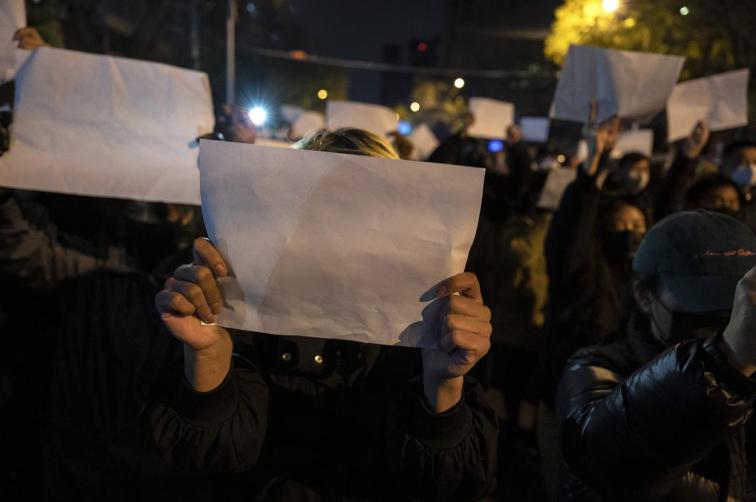The picture shows Cai Qi, a member of the Politburo Standing Committee of the Chinese Communist Party, attending the National People's Congress on March 12, 2023. (Screenshot from the web)
[People News] The Central Economic Work Conference concluded on December 12, following a Politburo meeting earlier in the week that set the tone for next year’s economic agenda. With two meetings in one week focusing on expansive economic policies, the frequent injections of "stimulants" were expected to energize the markets. However, Cai Qi, who oversees propaganda, overhyped expectations before the meeting and released an underwhelming post-meeting communiqué devoid of tangible, quantifiable measures. This directly deflated the market, causing the Shanghai, Shenzhen, and ChiNext indices to plunge. On the same day, foreign media reported that Xi Jinping, worried about undermining his authority, might avoid attending Donald Trump's inauguration ceremony. It was a double loss for Xi Jinping in a single day.
The Central Economic Work Conference was held in Beijing on December 11–12, bringing together the seven Politburo Standing Committee members and five top military officials to discuss major economic matters. On December 13, following the meeting, Cai Qi instructed party-controlled media to release the main content of the conference, accompanied by commentary to “set the direction,” “highlight key points,” and “shape the narrative.” However, the market reacted with unusual caution and pessimism. On December 13, the Shanghai, Shenzhen, and ChiNext indices fell between 2.01% and 2.48% by the close of trading. Hong Kong stocks also plunged, with the Hang Seng Index dropping 2.09% and falling below the critical 20,000-point threshold. These declines signaled a severe lack of market confidence, delivering a direct blow to the CCP.
The primary reason for the market’s reaction was the gap between expectations and reality. Since the September 26 economic stimulus policies were introduced, the CCP’s propaganda machinery has been in overdrive, continuously hyping up expectations for major central government interventions. Leading up to this week’s back-to-back economic meetings, the Politburo meeting on December 9 had already indicated plans for significant fiscal and monetary easing next year. The public eagerly awaited confirmation of massive, impactful measures that could jolt the markets back to life. Various reports and experts had suggested that the fiscal deficit ratio would rise to around 4%, amounting to approximately 5.5 trillion yuan, in addition to 5 trillion yuan in special bonds and 3 trillion yuan in special government bonds. These projections were touted as the largest stimulus package ever—an economic "ceiling."
In this context, Cai Qi’s propaganda apparatus worked at full capacity to stir up market enthusiasm and build anticipation. But in the end, the Central Economic Work Conference offered only vague statements without releasing any concrete figures or detailed plans. The fanfare and noise amounted to little substance. The market responded with indifference, and the stock markets declined. The Central Economic Work Conference can no longer fool the public.
The communiqué for this Central Economic Work Conference spans over 4,400 words. Compared to the 2023 Central Economic Work Conference announcement, the CCP has been forced to admit the "complex and severe situation of increased external pressures and mounting internal difficulties." Specifically, it acknowledged, "The current unfavorable impacts of external environmental changes are deepening, and our economy still faces many difficulties and challenges, mainly including insufficient domestic demand, operational difficulties for some enterprises, pressure on employment and income growth, and numerous risks and hidden dangers."
The communiqué included a rather puzzling statement: "In practice, we have continuously deepened our understanding of the patterns of economic work." Is this the CCP trying to whitewash itself? Or is it indirectly admitting that the CCP’s system fundamentally contradicts market and economic principles? Even more laughably, the meeting confidently asserted, "We must properly balance the relationship between an effective market and a proactive government to create an economic order that is both 'vibrantly unleashed' and 'well-managed.'"
The CCP’s genetic makeup is fundamentally about preserving its regime and the "red dynasty." Xi Jinping’s accelerated leftward shift reflects a return to a planned economy, expanding state-owned enterprises. As Stanford University’s Professor Xu Chenggang put it, this approach aims to combat "color revolutions" and peaceful evolution by cracking down on private enterprises. The CCP often says, "Deregulation leads to chaos, and overregulation leads to stagnation." The first half of that statement is a false proposition, while the second half exposes the fatal flaw of the communist system. The so-called "deregulation leads to chaos" reflects the CCP’s fear that reforms and opening up would collapse its ideological foundation and disrupt the vested interests of the red elite, ultimately threatening the survival of the "red dynasty."
Creating an economic order that is both "vibrantly unleashed" and "well-managed" is nothing more than wishful thinking and self-deception. It defies economic principles, akin to demanding both safety and economic growth, zero-COVID measures alongside high-speed development, and an indestructible shield paired with a razor-sharp spear. Such tactics are as harmful as they are foolish.
The entire conference communiqué is filled with empty slogans and clichés. Everything was discussed, yet nothing substantial was said. They aspire to accomplish everything but are incapable of achieving anything. On critical economic issues such as domestic demand, employment, and the real estate market, the CCP avoided specifics and offered no practical measures. Is it really that difficult? Vietnam, Elon Musk, or Javier Milei of Argentina—learning from any of these examples could solve many problems. Vietnam prioritizes employment, ensuring that its people grow wealthier despite the country's modest government spending. Musk advocates for a drastically downsized government. Milei takes it a step further with three bold moves: first, slashing government institutions to cut expenses, even abolishing the tax department; second, eliminating privileges because "all privileges are the enemy of the people"; and third, privatizing state-owned enterprises.
The CCP’s active fiscal stimulus primarily relies on issuing debt, which will only work until no one buys its bonds anymore. At that point, the regime would openly resort to monetizing deficits. Will lowering the reserve requirement ratio (RRR) help? Currently, medium and small banks already have an RRR of 5%, while large banks stand at 8%, leaving minimal room for adjustment. Banks are not short on funds; the issue is that capital is not circulating—loans cannot be issued because of insufficient demand and overcapacity. This liquidity stagnation means businesses have little reason to borrow, except perhaps to repay existing loans, which does not stimulate production. Even significant RRR cuts would only allow banks to play internal games, with little impact on the real economy. As for interest rate cuts, is there still any room? How would banks survive? The so-called "loose monetary policy" is a sham. For years, the CCP has claimed its monetary policy is "prudent," but it has effectively been highly accommodative, flooding the economy with liquidity. Without redistributing wealth back to the people, all efforts are in vain. In the 1980s and 1990s, newspapers were filled with stories about how to build wealth. Now, all the government thinks about is how to empty your pockets, using every tactic to bleed the people dry. Xi Jinping clings to the CCP’s red ideology like a demon possessed, steering the nation into a dead end.
Cai Qi’s missteps are mounting. During the Third Plenum, he ordered the removal of the article The Reformer Xi Jinping and sidelined the “Xi Core” narrative for a month. This time, his aggressive hype of stimulus policies backfired spectacularly, leaving another mess in its wake.
Xi Jinping is having a string of bad luck, suffering defeat after defeat. According to foreign media reports on December 12, Xi does not plan to personally attend Donald Trump's presidential inauguration in January. Previously, The Wall Street Journal reported that after Trump’s election victory, Xi eagerly sought to establish contact with Trump’s team but was repeatedly rebuffed. Now that Trump has extended an olive branch, why is Xi backing away?
Firstly, the CCP and the United States operate with entirely different approaches to politics and diplomacy. The CCP thrives on secrecy, preferring to operate in the shadows—scheming under the table, engaging in backroom deals, and buying influence. During Trump’s first term, Xi Jinping spent lavishly to court Trump’s son-in-law, Jared Kushner, believing that this tactic would work again. However, this time Xi has hit a wall. Trump, known for his straightforward and transparent style, refuses to play along with the CCP’s covert maneuvers. By publicly inviting Xi to the inauguration, Trump has flipped the script, forcing Xi into a visible spotlight. This open invitation left Xi scrambling for a response.
Secondly, Xi is genuinely fearful and unsure of what to expect. Memories of the infamous 2017 Mar-a-Lago dinner still haunt him. During that dinner, Trump shocked Xi by casually informing him that the U.S. had just launched a missile strike on Syria, a long-time CCP ally. Xi was reportedly stunned into silence for a full ten seconds. What card might Trump play this time, especially with the entire world watching? The uncertainty terrifies Xi.
Thirdly, the CCP is running out of options. Xi Jinping’s arsenal of strategies appears depleted. Trump’s push to impose tariffs on Chinese goods poses a significant challenge. How should Xi respond? Reuters suggests that the CCP might lower the yuan's exchange rate to counteract the tariffs. However, this tactic has serious downsides. A further devaluation of the yuan would accelerate capital flight and trigger backlash from China’s trade partners, who might retaliate with their own tariffs to protect their economies from an influx of cheap Chinese goods. This kind of chain reaction leaves the CCP cornered.
Fourthly, Xi faces mounting geopolitical pressure from Trump. It’s highly likely that Trump would use the inauguration as an opportunity to issue a clear warning to Xi, especially regarding China’s stance on the Russia-Ukraine conflict. Trump might demand that Xi play a constructive role in ending the war, rather than covertly undermining peace efforts. This would leave Xi in a precarious position, as the CCP has long relied on duplicity in its foreign policy.
For all these reasons, Xi had no choice but to decline Trump’s gracious invitation. His decision reflects not confidence but desperation, as he finds himself cornered with no good options. Trump’s move was a masterstroke, leaving Xi in a lose-lose situation. Accepting or declining the invitation both result in political defeat for Xi.
(Originally published by People News)











News magazine bootstrap themes!
I like this themes, fast loading and look profesional
Thank you Carlos!
You're welcome!
Please support me with give positive rating!
Yes Sure!